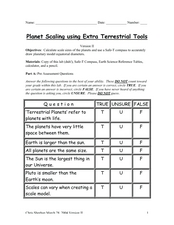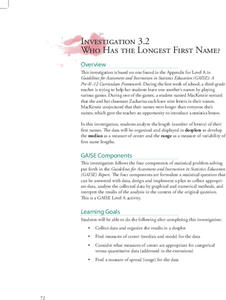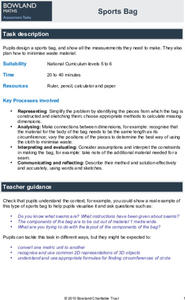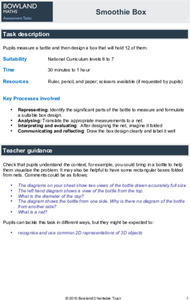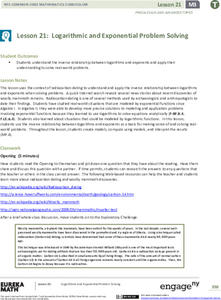Utah Education Network (UEN)
Sensational Subtraction Centers
Engage your kindergarteners in a center-based lesson which provides experience and exposure to the connecting and symbolic levels of subtraction. This excellent lesson has many wonderful activities and handouts included for each of the...
Curated OER
Making Money and Spreading the Flu!
Paper folding, flu spreading in a school, bacteria growth, and continuously compounded interest all provide excellent models to study exponential functions. This is a comprehensive resource that looks at many different aspects of these...
Curated OER
One of the Many Ways
Explore the concept of polynomials and determine the value and number of zeros for a given polynomial using the Rational Root Theorem. Then graph the polynomials and relate the number of zeroes to the degree of the polynomial.
New York Science Teacher
Planet Scaling using Extra Terrestrial Tools
Your class will use a set scale to convert diameters of planets to the model size, the diagram given to expand on the number of planets drawn as concentric circles, and examine the scale that would be needed to fit the larger planets on...
American Statistical Association
Who Has the Longest First Name?
Name that statistic! Classmates each write their name and the number of letters in it on a sticky note to place on the board. As a class, they determine the median, mode, and range of the name lengths, and create a dot plot of the data....
Bonneville
Solar Pathfinder Tutorial
Find the right path to learn about solar energy. Scholars set up and use Solar Pathfinders to take measurements related to solar insolation at a particular site. Based on the data, they estimate the solar potential in kWh/m^2/day of a...
Utah Education Network (UEN)
Expressions and Equations
Variables may be unknown, but expressions and equations are easy to understand. Pupils learn to write, evaluate, and simplify numeric and algebraic expressions. They also investigate how to write and solve simple equations and...
Utah Education Network (UEN)
Geometry
Shape one's understanding of geometry using the resource. The sixth of seven chapters in 6th Grade Math focuses on geometry principles. Future mathematicians learn to find the area of parallelograms, trapezoids, triangles, and other...
Utah Education Network (UEN)
Statistics
Find the value in analyzing data values. Statistics is the focus in the fifth of seven installments of the 6th Grade Math series. Individuals learn to examine dot plots, histograms, and box plots by considering the shape, mean, median,...
Utah Education Network (UEN)
Extending the Number System
Don't feel negative about negative numbers. Individuals extend their knowledge of positive numbers and fractions to rational numbers. They see how to represent negative rational numbers on a number line, learn about opposites and...
Utah Education Network (UEN)
Percent, Division with Fractions, and Measurement Conversion
The resource will be 100 percent beneficial. The third of seven installments in 6th Grade Math starts with lessons on percent and percent problems. Pupils also learn how to divide fractions and apply ratio reasoning to convert units,...
Utah Education Network (UEN)
Ratio Relations
At this rate, the class will be experts on ratios and rates in no time. A class workbook teaches individuals about ratio language, using tables and tape diagrams to find equivalent ratios, and solving ratio problems. They then discover...
Flipped Math
Unit 10 Review: Quadratics
Everything one wanted to know about parabolas in one place. Pupils work 27 problems as a review of the unit on quadratics. Problems range from determining key features of the function and using that information to graph the parabola, to...
Flipped Math
Modeling with Quadratics
Do some interpretive modeling. Class members watch three examples of interpreting key features of a graph of a quadratic to find solutions to a real-world problem. Learners review how to find the key features on a graph using technology...
Flipped Math
Exponential Decay
The values keep getting smaller—quickly! Pupils watch a video that contrasts exponential decay with exponential growth from the first lesson in the unit. Learners identify exponential functions that are decaying and create graphs of...
Bowland
Sports Bag
Lay it out using the least amount of material. Learners use the dimensions of a cylindrical sports bag to find out the size of pieces of material needed to sew them. The pupils find the best placement of the pieces to use the least...
Bowland
Security Camera
Take an overall view of percentages. Pupils determine whether a shop owner's claim is correct about what percent of his shop is viewable from the installed security camera. Learners try to find whether there is a better location for the...
Bowland
Patchwork Cushions
Find out if there are enough squares. Given diagrams for the first four figures in a sequence, pupils try to determine the next figure. Individuals find the number of square and triangle pieces of fabric that are required to make...
Bowland
Smoothie Box
Make it a tight fit. Given drawings of a smoothie bottle, pupils need to determine the size of a box to hold 12 bottles. Scholars draw a net to show the dimensions needed to create a closed box that would not allow the bottles to move...
Mathalicious
Pandemic
Young scientists use exponential growth and logarithms to model how a virus spreads through a population. Pupils watch a news clip about the 2012 outbreak of Ebola. Scholars then manipulate inactive graphs to see how various factors...
Teach Engineering
Computer Simulation of an Artificial Neural Network
Ready to learn about machine learning? Pupils explore neutral networks and machine learning by analyzing the logic used in a single perceptron model. They consider its weaknesses and then use a multi-layer perceptron model to run...
EngageNY
Solving Problems by Function Composition
Stay composed while solving problems. Learners put their knowledge of compositions to solve problems. To connect with the concept, scholars compose equations to answer questions from real-world situations. Finally, pupils practice using...
Teach Engineering
Exploring Variables While Testing and Improving Mint-Mobiles (for High School)
Mint candies are good for more than just one's breath. Using basic materials such as mint candies, straws, index cards, and Popsicle sticks, scholars create race cars that meet a given budget as well as design constraints. They perform...
EngageNY
Logarithmic and Exponential Problem Solving
Just how old is it? The 22nd portion to a 23-part Precalculus unit uses radiocarbon dating and other exponential modeled real-world problems. Learners use the inverse relationship between logarithms and exponentials to solve the problem...





